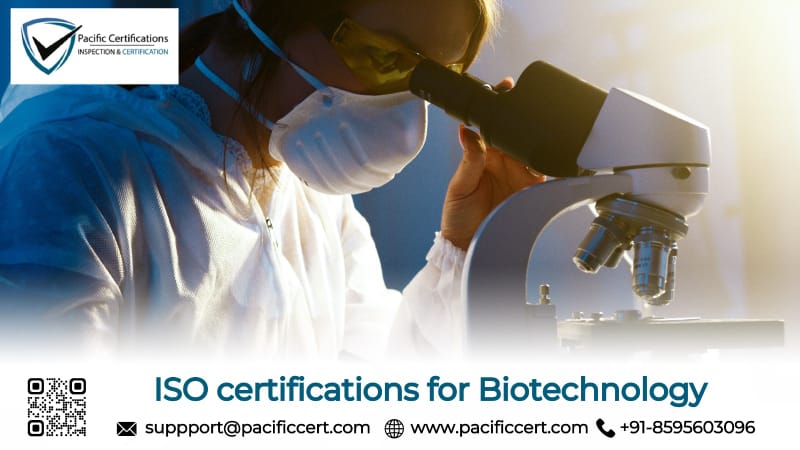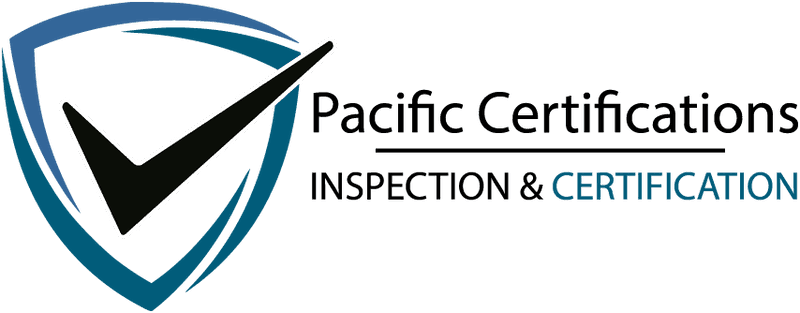ISO Certifications for Biotechnology Industry, Requirements and Benefits

Introduction
The biotechnology industry operates within highly regulated environments where pharmaceutical companies, medical device manufacturers, research laboratories, and biopharmaceutical producers must manage complex biological processes, control stringent quality parameters, and maintain compliance with evolving regulatory frameworks. Businesses face operational challenges including maintaining sterile manufacturing conditions, ensuring data integrity across clinical trials, managing biological hazards in laboratory settings, and demonstrating product consistency from cell lines derived from living organisms. Regulatory pressures intensify as agencies scrutinize Good Manufacturing Practice compliance, biosafety protocols, and documentation integrity across research, development, and production phases.
ISO certifications provide biotechnology businesses with systematic frameworks to standardize quality controls, implement biosafety management, protect sensitive research data, and demonstrate regulatory compliance. International regulatory bodies and major pharmaceutical partners increasingly require documented management systems as prerequisite qualifications, while investors and funding agencies evaluate ISO certification as indicators of operational maturity and risk management capability.
Innovation in biotechnology must rest on the pillars of quality, safety and trust, ISO certifications transform these principles into measurable performance.
Quick summary
ISO certifications provide biotechnology businesses with internationally recognized frameworks to manage quality through ISO 9001, medical device compliance through ISO 13485, laboratory competence through ISO 15189, biosafety through ISO 45001, information security through ISO 27001, and environmental responsibility through ISO 14001. These standards address the biotechnology industry's critical requirements for regulatory compliance, data integrity, biosafety management, and sustainable practices while supporting market access and investor confidence.
For more information on how we can assist your biotechnology business with ISO certifications, contact us at [email protected].
Applicable ISO Standards for Biotechnology Industry
Below are the most relevant ISO standards applicable to pharmaceutical companies, medical device manufacturers, research laboratories, and biopharmaceutical production facilities:
ISO 9001:2015 - Quality Management Systems
ISO 9001 enables biotechnology organizations to establish documented procedures controlling research protocols, development processes, manufacturing operations, and quality assurance activities ensuring consistent product quality and regulatory compliance. Implementation supports regulatory submissions by demonstrating systematic approaches to process control, documentation management, and continuous improvement that complement Good Manufacturing Practice requirements.
ISO 13485:2016 - Medical Devices
This specialized standard specifically addresses quality requirements for medical device and in-vitro diagnostic manufacturers, emphasizing device safety, risk management, design controls, labeling accuracy, and regulatory compliance. Implementation becomes mandatory for biotechnology companies developing diagnostic tests, medical devices, or therapeutic products requiring regulatory approval from health authorities.
ISO 27001: Information Security Management Systems (ISMS)
Biotechnology companies handle highly sensitive data including genetic information, clinical trial records, proprietary research findings, patient health information, and intellectual property requiring protection against cyber threats and unauthorized access. This standard provides comprehensive frameworks for access controls, data encryption, secure data storage, incident detection, and regulatory compliance with data protection legislation.
ISO 15189:2022 – Medical Laboratories Requirements for Quality and Competence
This standard validates technical competence of clinical and diagnostic laboratories conducting patient testing, establishing requirements for quality management, technical operations, measurement traceability, and result accuracy. Implementation demonstrates laboratory capability to produce reliable diagnostic data supporting clinical decisions while satisfying accreditation requirements from regulatory authorities.
ISO 17025:2017 - Testing and Calibration Laboratories
Research and quality control laboratories conducting analytical testing for product characterization, purity assessment, potency determination, and stability studies require internationally recognized competence demonstration. This standard establishes requirements for technical competence, method validation, measurement traceability, equipment calibration, and quality control procedures enhancing credibility of test data used for regulatory submissions.
ISO 14001:2015 - Environmental Management Systems
Biotechnology Industry often deal with complex environmental issues. ISO 14001 helps organizations improve their environmental performance through efficient use of resources and reduction of waste.
ISO 45001:2018 - Occupational Health and Safety Management Systems
Biotechnology operations involve significant biosafety risks including exposure to pathogenic microorganisms, handling of cytotoxic compounds, chemical hazards from reagents and solvents, cleanroom contamination risks, and sharps injuries during laboratory procedures. This standard establishes frameworks for biosafety risk assessment, personal protective equipment protocols, biological containment controls, and incident management that protect workers in laboratory and manufacturing environments.
Click here to find out more applicable standards to your industry
What are the Requirements of ISO Certifications for Biotechnology Businesses?
Biotechnology manufacturers seeking ISO certification must establish and maintain documented policies, procedures, and records aligned with the selected ISO standards. Key requirements include the following:
ISO 9001:2015 – Quality Management Systems
Define quality objectives for product specifications, process parameters, documentation accuracy, and customer satisfaction with measurable targets
Implement documented procedures for research protocols, manufacturing processes, quality control testing, and product release criteria
Establish change control procedures for process modifications, equipment updates, and protocol revisions with impact assessments
Maintain comprehensive records of batch production, testing results, deviations, investigations, and corrective actions
Control supplier qualification for raw materials, reagents, and critical components through quality agreements and audits
ISO 13485:2016 – Medical Devices Quality Management Systems
Implement risk management processes identifying device hazards, evaluating risks, establishing controls, and monitoring effectiveness
Establish design controls including design planning, input requirements, verification, validation, and design transfer procedures
Define production controls with documented manufacturing instructions, specifications, inspection procedures, and release criteria
Maintain device master records, device history records, and complaint handling systems tracking post-market performance
Conduct management reviews evaluating quality metrics, regulatory compliance status, and continuous improvement effectiveness
ISO 15189:2022 – Medical Laboratories Quality and Competence
Demonstrate technical competence of personnel through qualification records, training documentation, and competency assessments
Establish measurement traceability linking test results to international reference materials and calibration standards
Implement quality control programs including internal quality controls, proficiency testing, and interlaboratory comparisons
Maintain standard operating procedures for sample handling, testing methods, result reporting, and critical value notification
Document pre-analytical, analytical, and post-analytical processes ensuring result accuracy and turnaround time compliance
ISO 45001:2018 – Occupational Health and Safety
Conduct biosafety risk assessments identifying biological hazards, exposure routes, and contamination scenarios across operations
Implement biosafety containment controls matching biosafety levels to pathogen risk classifications and experimental procedures
Establish personal protective equipment requirements including respiratory protection, gloves, gowns, and eye protection specifications
Define protocols for aerosol-generating procedures, sharps handling, spill response, and decontamination procedures
Provide biosafety training for personnel addressing biological hazards, containment practices, emergency procedures, and medical surveillance
ISO/IEC 27001:2022 – Information Security Management
Implement access controls restricting clinical trial data, genetic information, and proprietary research to authorized personnel
Establish data encryption for storage and transmission of sensitive information protecting confidentiality during transfer
Define data backup and recovery procedures ensuring business continuity and preventing data loss from system failures
Conduct security audits and vulnerability assessments identifying information security risks requiring mitigation
Maintain incident response procedures for data breaches including notification protocols and forensic investigation
ISO 14001:2015 – Environmental Management Systems
Identify environmental aspects including biological waste generation, chemical disposal, solvent emissions, and energy consumption
Establish environmental objectives with measurable targets for waste reduction, emissions control, and resource efficiency
Implement controls for biological waste segregation, chemical disposal, autoclave sterilization, and hazardous waste management
Monitor environmental performance through tracking waste volumes, energy consumption, and regulatory permit compliance
Tip: Implement integrated quality management software platforms combining electronic batch records, document control systems, training management, deviation tracking, and CAPA workflows into unified databases that simultaneously support ISO 9001 quality requirements, ISO 13485 medical device controls, ISO 27001 data security, and ISO 45001 safety management while ensuring audit trail integrity and regulatory compliance.
For more information on how we can assist your biotechnology business with ISO certifications, contact us at [email protected].
What are the Benefits of ISO Certifications for Biotechnology Businesses?
ISO certifications provide biotechnology companies with strong operational and commercial advantages, including listed below are the key benefits for ISO standards applicable to pharmaceutical companies, medical device manufacturers, research laboratories, and biopharmaceutical producers.
Enhanced regulatory compliance and approval success by demonstrating systematic quality controls that complement regulatory requirements and strengthen submissions
Improved product quality consistency reducing batch failures and ensuring biopharmaceuticals meet specifications for potency, purity, and safety
Stronger market access and customer confidence as certification provides assurance to regulators, investors, and partners regarding operational capability
Better data integrity and security protecting sensitive clinical trial information, genetic data, and intellectual property from cyber threats
Greater investor confidence and funding opportunities as ISO certification signals operational maturity and risk management capability
Reduced biosafety incidents and worker protection through systematic hazard controls preventing laboratory exposures and contamination events
The global biotechnology market valued at USD 1.77 trillion in 2025 projects growth to USD 6.34 trillion by 2035 at a compound annual growth rate of 13.61%, driven by technological advances including CRISPR gene editing and AI-driven drug discovery alongside increasing chronic disease prevalence. Regulatory bodies worldwide demand stricter quality, environmental, and safety compliance as research complexity grows, making ISO certification increasingly essential for regulatory approvals and investor confidence.
Industry outlook indicates explosive growth of mRNA and gene therapies post-pandemic, rise of synthetic biology for custom organism design, expansion into emerging markets across Asia-Pacific and Latin America supported by favorable government policies, and integration of artificial intelligence in biological data analysis. Primary growth drivers include breakthrough omics technologies, precision medicine demand, agricultural biotech expansion for climate-resistant crops, and digitalized laboratories requiring robust ISO frameworks for operational discipline and risk management.
How Pacific Certifications Can Help?
Pacific Certifications, accredited by ABIS, acts as an independent certification body for biotechnology businesses by conducting impartial audits against applicable ISO standards. Our role is to objectively assess whether documented management systems and laboratory operations, manufacturing practices, biosafety controls, and data security procedures conform to international ISO requirements, based strictly on verifiable evidence and operational records.
We support biotechnology industry providers through:
Independent certification audits conducted in accordance with ISO/IEC 17021 for quality, medical device, laboratory, environmental, safety, and information security management systems
Practical assessment of actual biotechnology operations, cleanroom controls, biosafety containment, data management systems, and quality assurance procedures
Clear audit reporting reflecting conformity status and certification decisions based on documented evidence
Internationally recognized ISO certification upon successful compliance demonstration enhancing regulatory credibility and market access
Surveillance and recertification audits to maintain certification validity and support continuous improvement initiatives
Contact us
If you need support with ISO certification for your biotechnology business, contact us at [email protected] or +91-8595603096.
Author: Sony
Read More at: Blogs by Pacific Certifications

